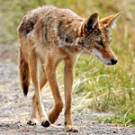Mullaqat phrase of the day
Sutraqwatu: The transient experience of living in the absence of desire and attachment, in an unencumbered perspective that allows one to experience the free-floating perfection of the moment, or “hurumulla tibwa.”
Ah, cleverness
HOW COYOTE GAVE THE MULLAQAT THEIR CLEVERNESS: A Mullaqat creation myth… One night after their return to the new world, the Mullaqat looked at Grandmother Hen and said, “Tell us about our Father.” “Your Father was named Coyote, and he was the most playful and clever of all the living things,” Grandmother Hen said. “Would you like to meet him?” “Yes!” the Mullaqat said. And so Grandmother Hen sang a ghost song and the ghost of Coyote appeared and said “Why have you bothered me, woman?” “You’re the clever one, so teach your children their lesson,” Grandmother Hen said. “Then gather around me here, Mullaqat children,” Coyote said. And once they were seated, Coyote’s ghost gobbled up all the Mullaqat children seated to the left of him. Then he turned to those seated the right side and said, “I loved those children as much as I love you, but I ate them and now they are dead. What is the lesson?” “Everything dies,” said the Mullaqat, “so death cannot be judgment.” “Correct,” Coyote said. “And that was a very clever way of teaching you the lesson, too. But now half my children are gone and I miss them,” Coyote said. “Why do I never learn?” “Because cleverness is the fastest path to fucking up,” the Mullaqat replied. “How very clever of you to see that,” Coyote’s ghost said. Then he smiled at them and disappeared into the night. “Grandmother Hen,” the Mullaqat asked, “has our Father blessed or cursed us with his cleverness?” Grandmother Hen fell silent, pondering her answer. And in time she said, “Well, we shall...
Mullaqat creation story
GRANDMOTHER HEN, COYOTE AND THE COLORS OF THE WORLD In the beginning, the world was without color, and Grandmother Hen made her nest deep in the ground and settled down to brood over her beloved egg. From time to time, Grandmother Hen would poke her head out of the nest to look for color, but finding none, she would settle back on her egg and go back to sleep. But one day Grandmother Hen came up and saw the color red and said, “I name you Horizon.” And the next day she came up and saw the color gold, and said “I name you Sun.” And the next day she came up and saw the color brown, and said “I name you Dirt.” On the fourth day she saw blue and named it “Sky,” and on the fifth she stuck her head up and saw a green seedling pushing its way up from the dirt and said “I name you Life.” And deep in her nest, Grandmother Hen pondered the colors of the world and her egg in the belly of the world, and decided it was time to hatch. She pecked it with her beak and it split open, and out came all the people and all the animals and all the plants. The people ran off to the four corners, but some stayed with Grandmother Hen and her plants and animals, growing happy and fat. “Take want you need,” Grandmother Hen told them, “but remember you were all born of the same egg.” One day Coyote came home to Grandmother Hen with a multitude of the people behind him and said “You know, we’ve been thinking, and uh, it occurs to us that you are just a simple hen, and why do we listen to you? We have grown so much more clever than you will ever be!” Grandmother Hen replied: “You’re about to fuck up, Coyote.” Coyote said, “Ha! I see no evidence of that! Oh, and by the way, Grandmother – Look! Over there! A monster!” “A monster!” Grandmother Hen said, clearly alarmed. But when she looked where Coyote had indicated, the people from the Four Corners rushed her and pinned her down. “See?” Coyote said. “You really are a just a silly bird. And since the world belongs to the clever, not the simple, we are going to take your food, because we deserve it. And besides, you can’t stop us.” Grandmother Hen replied: “You’re fucking up, Coyote.” But Coyote and the people from the Four Corners all laughed, and proceeded to eat everything the Grandmother Hen and her family had. Filled with all Grandmother’s food, Coyote and the people from the Four Corners grew to immense size, and celebrated their power by throwing an elaborate feast. But soon all that food was gone, and as big as they had become, Coyote and the people from the Four Corners found that they were ravenously hungry. And with no more food to be found, they set upon each other, tearing each other to bits and devouring the pieces. Finally, only Coyote was left, and he was so hungry that he ate all the colors in the world, until it fell cold and still all over again. Remorse filled him, and he sang a lamentation song. “I fucked up, didn’t I Grandmother Hen?” he said. “Of course you did, dummy,” Grandmother said. “You always do. Now come over here and fuck me before you die so that I can make a new egg.” And so Coyote fucked Grandmother Hen and then promptly died, and Grandmother Hen laid her egg in a deep underground nest and waited for color to return to the world. Not so very long afterward the color returned. Grandmother Hen pecked open the shell of her egg and out came the people and the plants and the animals. The people immediately ran off to the Four Corners, but a few children stayed with Grandmother Hen and started wandering about, just looking around at the colors of the world, and they were called the Mullaqat....
The rest of the story
Over the years, there have been a few people outside my immediate family who’ve read the first two books of The Key To Darbas (which were, in an earlier version, one book that was a bit shorter than the combination of the two published books), and their feedback has been encouraging. But the thing that really gets my attention is when a reader starts talking about wanting to know what happens next. I got that comment this week from my fellow Charleston soccer fan, Steve Waszkiewicz, a fantasy reader who picked up both A Madness and Siobeth in late November. It reminded me that while I’ve been carrying around a version of that story in my head for more than a decade (I think I first wrote down the arc of that larger story in late 2001), it had been a long time since I revisited it. That’s what I did yesterday, producing one 12-page document that outlines the story through books three, four and five. And I know it’s different from that first outline, if only because as I wrote the first two books, the characters took over and changed the story. There are several important characters I haven’t introduced yet, and one unanticipated character who invaded my thinking so forcefully in 2010 that I had to sketch out an entire prequel simply to keep her happy. I’m sure the story will change from this outline, too. And there’s one immense card I haven’t played yet — simply because none of the resolutions I’ve considered for that subplot have the gravity and resonance the storyline demands. It wasn’t there at the beginning, but it feels like that idea worked, and the tale won’t be complete until I wrap it up. As I’ve said before, whether I write any of this largely depends on reader response. And that’s not because I’m trying to be coy. It’s not that I don’t want to finish this story. It’s just that I’m a working man with no savings or trust fund, and ultimately I need to limit the time I spend on projects that don’t generate something positive. But as I went over my work last night, I found myself wondering whether the next step is to write the prequel, or Book Three. Book Three is the obvious option, as it advances the plot and scratches the itch. The prequel, on the other hand, could give that plot a deeper meaning. So I don’t know. That’s the adventure of the whole thing. GIVEAWAY UPDATE The reason I decided to go exclusively with Amazon during the first three months of my ebook publishing experience was pretty simple: Amazon Direct Publishing offered — in theory, at least — an audience and a means of reaching out to it that my other options simply didn’t. That’s because ADP provides enough promotional options that I should be able to offer a series of giveaways and countdowns for my novels that should cover much of the three-month commitment. Would that be a good deal for an established author? Probably not. But I’m not kidding myself about how obscure I am. Anyway, I did my first giveaway on Dec. 4-5, and I did it around A Madness. Talked about it on Twitter and Facebook. I had two hopes for the event: First, I wanted to give away at least 75 copies; and second, I wanted to expand my reach to readers who have absolutely no idea who I am. The outcome, as I reported it on my Facebook page: Here’s the final tally for that first first Amazon promotion, this time for “A Madness.” U.S., 85; UK, 21; Germany, 11; Italy, 1. That’s 118 books. Strangely enough, one unit from Japan, one unit from Spain and two units from Canada, all of which were listed last night, are not listed this a.m., but whatever. It exceeded my numerical goal, and since there aren’t 11 Germans and 21 residents of the UK on this Facebook list, it accomplished my primary goal, too: Push one of my titles out beyond this poor little group of friends who has to hear about this topic over and over. Honestly, I’m a bit surprised by the number of overseas sales. But since I can account for only one of those via a friend, I figure the overseas sales indicate something of the power of small advantages in large audiences. Think of it this way: 118 books in two days was enough to drive A Madness into the Top 50 in the Epic Fantasy category on Kindle for a few hours. That’s statistically insignificant to Amazon, but meaningful to...
Get ‘A Madness’ for free, Dec. 4-5
As I’ve just announced over at my author website and Facebook page, I’m doing my first promotion for A Madness on Amazon today and tomorrow (Dec. 4 and 5, 2013). Here’s a glimpse of what that means in terms of exposure. In the first week after I announced that I had books to sell, I sold 10 copies of A Madness at $0.99 a download. The week after, without any kind of push behind it, I sold one copy. That’s 11 copies of A Madness between Nov. 22 and Dec. 3. In the first 15 minutes of offering A Madness for free, I moved five copies. The way I figure it, those first five copies are probably friends of mine — probably from the group of 216 people who “Liked” my author page and get my updates. But the real purpose of offering the book for free is to expand my reach beyond my friends and into a world of readers I’ve never met. And that’s the exciting/dreadful part. I think there will be people who like this book and its sequel. Certainly not everyone, but that’s not the point when you write in a genre. Then again, I’ve reviewed fantasy novels that I’m still shocked that anyone bothered to read, much less publish and promote. I’m thinking about one in particular, of course, and this especially awful bit of prose — the first in a three-book series from a big publishing house — has 171 reviews on Amazon. Granted, 83 of them give it one star, but the point is that right now, I’ll be happy to get 171 downloads of A Madness, free or otherwise. The reason exposure matters to me is that when a publishing house puts out a new fantasy series, the marketing department makes sure people see it and talk about it. It puts hardcover copies in the hands of reviewers like me, runs ads, talks it up at trade shows and whatnot. My job is a bit different. Having written it, I now have to figure out ways to get people to notice it. And I understand that if you don’t like it — or, to be more honest, if you don’t love it — it’s probably just something I’ll have to file as a learning experience. The early feedback I’ve gotten has been great, but that’s kinda what you’d expect from people you know. It’s like your spouse telling you you still look nice after all these years. Might be true. Might be just politeness. So what I’m really seeking are the reviews of people I’ve never met, who have nothing to go on except the words on the electronic page. No marketing departments squawking about “THE EPIC FANTASY OF THE YEAR,” no clever press kits and schwag for reviewers. My hope here is that you’ll love it enough to talk about it, and that from you early readers we’ll grow something that lets me write more of these. But I can’t know that any more than anyone at the publishing houses can know. We all have our ideas about what’s good and what isn’t, but in the end, it’s up to the readers. They decide. Granted, it’s harder to get the word out when nobody else is invested in you. And there’s always the risk that, in trying to find readers for your work, you become “that guy” who just bugs the hell out of his friends. But I figure, one way or another, I’ll get my...






Recent Comments